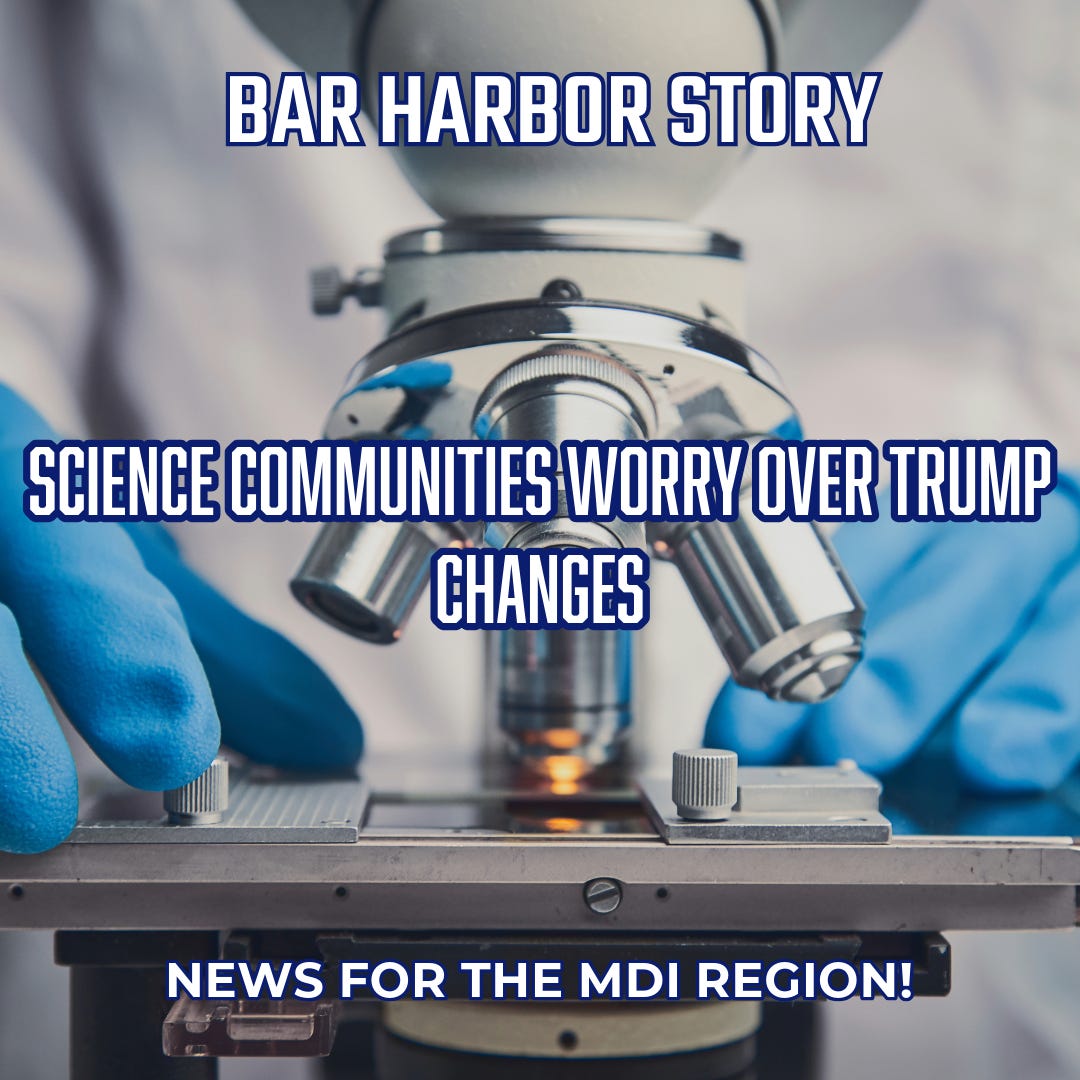BAR HARBOR—The MDI Biological Laboratory’s newsletter’s header this weekend was simple: “Science is Hope.”
That message came in a direct response to a possible decrease in National Institutes of Health (NIH) research funds and just before reports of approximately 1,200 NIH employees being let go.
“If executed, the reductions will slow the pace of discovery on our campus and put jobs at risk,” the newsletter read.
When an institution such as MDIBL or Jackson Laboratories asks a granting agency for research support, it asks the granting agency for funds to cover “direct costs” to pay for the experiment or study, and “indirect costs” to reimburse the applicant institution for overhead (lab space, maintenance costs, HR costs, utilities costs, etc.).
Each applicant institution has a negotiated indirect cost rate (ICR) that the granting agency allows the applicant agency to include in its grant request.
The indirect cost rate is expressed in percentage terms. For example, if an institution’s ICR is 47.5 %, when it asks for $100,000 to conduct a research experiment, it can add $47,500 to the direct cost request.
Research institutions depend on indirect cost recovery to maintain up-to-date infrastructure and the services necessary to propose and conduct research.
“Now is the moment for all those who stand with science to speak out,” said Hermann Haller, M.D., President and CEO of MDI Biological Laboratory. “We are profoundly grateful for the support we’ve received from our community. It’s urgent that we keep pressing the case for our work to transform human health for the better.”
According to a February 15 release by MDI Bio Lab, “The National Institutes of Health this month issued Supplemental Guidance announcing a 15% cap on reimbursements for support services for direct biomedical research, such as electricity, heat, animal care, safety systems, and regulatory compliance.”
A federal court in Massachusetts has temporarily stayed that decision.
The lawsuit reads, “Without relief from N.I.H.’s action, these institutions’ cutting-edge work to cure and treat human disease will grind to a halt.”
The New York Times quotes Kush Desai, a White House spokesman as saying, “Contrary to the hysteria, redirecting billions of allocated N.I.H. spending away from administrative bloat means there will be more money and resources available for legitimate scientific research, not less.”
Despite the pause, the worries continue.
“But it remains a major threat to MDI Biological Laboratory’s mission to make life-changing discoveries for human health while training a new generation of science leaders,” the lab wrote.
Maine and twenty-one other states have sued the Trump administration about the NIH funding cuts. The states believe that since a federal law created the funding formula, it can only be dismantled by Congress passing another federal law doing so.
Opponents to the change say that circumventing Congress to do away with Congressionally approved funding would be called impounding which is meant to be protected by the Congressional Budget and Impoundment Control Act of 1974.
“It would be devastating,” Karen Houseknecht, vice president for research and scholarship at UNE told the Portland Press Herald about the cuts. “It could shut things down.”
Last year, the MDI Biological Laboratory received approximately $6.5 million from the NIH. The Jackson Laboratory received approximately $82 million. The Jackson Lab is one of the largest employers in Hancock County. Much of its operations included sending mice to labs that are NIH funded. Those labs exist throughout the country and will likely be effected as well.
“The consequences of the rate cap would reach far beyond Mount Desert Island. It would undermine the nation’s global leadership in biomedical science, choke off the job-creating engine of biomedical innovation, and interrupt the steady pace of medical breakthroughs to combat deadly diseases and save lives,” the newsletter reads.
The bio lab estimates that in a typical year, that grant support would reduce by approximately $1.9 million annually. That includes approximately $580,000 in sub-awards to the laboratory partners, including Maine INBRE.
This past August, MDI Biological Laboratory celebrated a renewed grant from National Institutes of Health (NIH) for a $19.4 million NIH grant to renew and expand the Maine INBRE (Idea Network of Biomedical Research Excellence) network.
“Remarkable research is taking place right here in Maine. The Maine INBRE is helping to make it possible,” Maine Senator Susan Collins (R) had said.
There are nearly 500 life science companies in Maine, Collins had said. “Together those companies have created nearly 10,000 Maine jobs.” Those jobs, she said, are great ones, with average incomes over $100,000 a year. It has directly invested $87 million in Maine so far.
The biomedical sector has grown by 45% in the past five years, said Hallier, president of MDI Biological Laboratory. INBRE is the “backbone of Maine’s live science sector,” he said.
“There is no investment that pays greater dividends to American families than our investment in biomedical research,” Senator Collins said this week in a statement according to the Associated Press.
The potential cut is believed to have significant implications for the community of scientists on Mount Desert Island and beyond.
“That represents a 27% decrease in expected funding to support ongoing grants that are at the core of our research, training and outreach programs,” the MDI Biological Laboratory wrote.
“The measure would slow, and in some cases may end, front-line biomedical research projects. It would severely limit training opportunities for college students and early-career scientists,” the bio lab reports. “Perhaps most dishearteningly, it would imperil the job stability of the dedicated people in our workforce.”
Some institutions that would be impacted have explained that “they would adjust by simply doing less medical research, because they would not be able to afford to do as much with less government help,” the Times writes. “Universities and hospitals might also shift the kinds of research they do, avoiding areas that require more lab space, regulatory compliance or high-tech equipment, and focusing on types of research that will require them to provide less overhead funding themselves. That may mean disproportionate reductions in complex areas of research like genetics.”
State Representative Gary Friedmann (D-Bar Harbor) shared a letter he sent to Secretary Kennedy urging him to “immediately withdraw the National Institute of Health’s (NIH’s) Supplemental Guidance to the 2024 NIH Grants Policy Statement: Indirect Cost Rates.”
“If implemented, this policy will do immense and immediate harm to our nation’s world-class biomedical research system, including two leading research institutions located in the district I represent in Maine’s House of Representatives: The Jackson Laboratory and the MDI Biological Laboratory. In addition to generating important research findings that have contributed to the development of life-saving treatments, these two institutions are among my district’s most important employers. The Jackson Laboratory alone employs nearly 1,700 residents across several counties in rural coastal Maine. The sudden loss of research facilities and administrative cost payments that NIH had already agreed to provide through extensive and good-faith negotiations with each of these two institutions will have widespread negative impacts, including immediate job losses, hardship for local businesses that supply goods and services to these institutions, and the weakening of a skilled local workforce that has taken decades to develop,” Representative Friedmann wrote.
“In addition, these cuts also threaten workforce training programs that ensure the next generation of scientists, physicians and entrepreneurs are available to provide cutting-edge medical treatments and care,” he continued.
Friedmann said that he shares the “goal of ensuring that taxpayer dollars are used efficiently,” but believes that the indirect cost policy “risks moving our nation and my district in the opposite direction.”
The Jackson Laboratory did not respond to requests for a statement about indirect costs or about potential employment losses.
The Bar Harbor Story is generously sponsored by Rick Osann Art.
LINKS TO LEARN MORE
To read the court documents in NIH case
MDI Islander article about NIH funding
Photos: Carrie Jones/Bar Harbor Story
If you’d like to donate to help support us, you can, but no pressure! Just click here (about how you can give) or here (a direct link), which is the same as the button below.
If you’d like to sponsor the Bar Harbor Story, you can! Learn more here.












Thanks for your coverage of these local impacts of the Trump "wood chipper" approach to federal agency staffs and budgets.
Fantastic letter to the unqualified to be a Secretary Kennedy, Representative Friedman!
Please keep your public letters and oratory coming
about how the Musk / Trump coup is a threat to everyone’s health, jobs, economic security, and our most private information to bad actors around the world to do evil. You have a bigger pond in which to work for the common good , and I admire your courage to wade into the deep, dark waters of the aforementioned dastardly duo in the Oval Office.
I appreciate the article, BHS, about the devastating effects of the Musk/Trump regime change. However, in addition to reporting and publishing happy news and photos about Collins in 2024, I wish you had contacted her about why she has supported this current administration’s dismantling of our once great American democracy, or at least pointed out how she is doing nothing to stand up for her constituent’s best interests. (. Well, she is standing with the greedy oligarchs, and corporations who are a tiny minority)